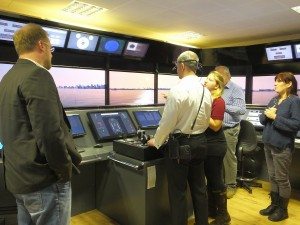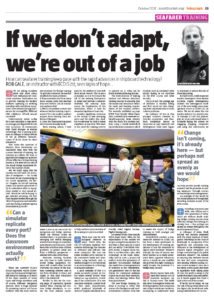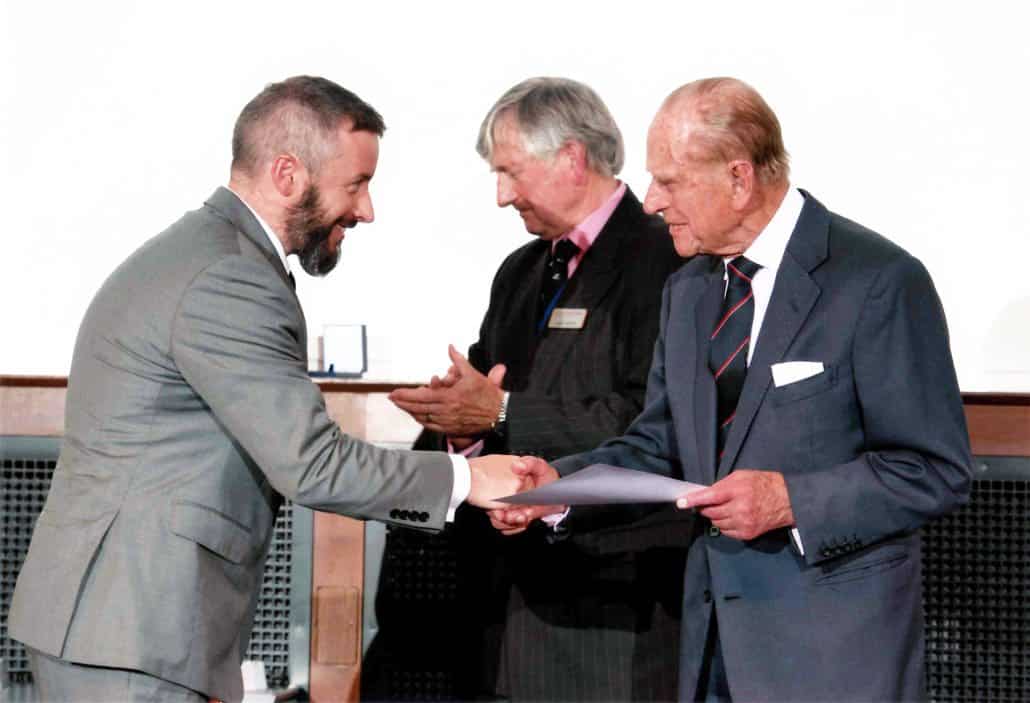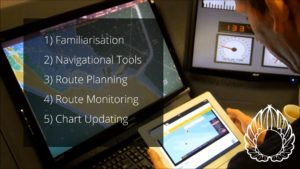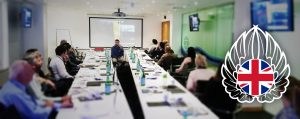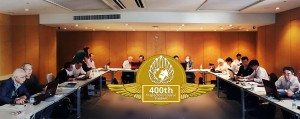Article
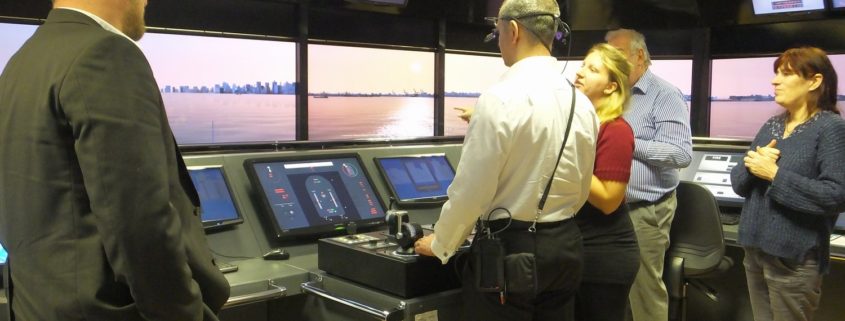
The Evolving Standard of Simulated Bridge Team Training
By Rob Gale – ECDIS Ltd Instructor
We ask ourselves more and more “How well prepared are traditional maritime institutions at providing training for modern seafarers to operate on evolving new ships with vast and varied new equipment? How relevant and appropriate are the varying BTM, BRM and CRM syllabi offered around the World?”
Unfortunately, initial outlay for a new simulator is expensive. An average FMB of 360 degree costs over £300,000 GBP. This in conjunction with rapid changes in marine technology is putting pressure on colleges to adopt several of the 38 different manufacturers of ECDIS alone for their simulators. This raises the questions; can these institutions reasonably keep pace with the current demands that are needed to train the industry as a whole? We have to approach the dangerous question of how effective is a bridge training course if it does not use any of the actual bridge equipment fitted to the student’s vessel. Yes we could argue that the courses can still teach the principles of navigation, but surely the closer we are to practicing on our actual equipment the better. Perhaps try to imagine an aircraft training centre that teaches Pilots how to fly planes in a simulator that has no equipment similar to their actual plane. Would we still be happy to get on board for our summer holiday assuming the first time the pilot worked through the ‘what if’ equipment and team failures was during a real emergency or accident at 35,000 feet?
There are currently 75,000 SOLAS registered vessels operating at sea that require bridge team and resource training. As a result of the sheer number of varying vessel types and Bridge Interfaces, and of course different navigation systems, there is huge demand for preparing our current and future seafarers with the most genuine realistic environment for true bridge training.
To provide a solution we first need to establish what the main problems are;
- Ships now sail to and from many more coastal ports and marinas than ever before. Can all simulators replicate this?
- Who is the modern seafarer and what are their training requirements? Does the modern seafarer require more training than perhaps seafarers of the past?
- Does a classroom/simulator environment actually work?
Since coming ashore in the maritime industry I have now taken a role as an Instructor for Navigation and Bridge systems. There are obvious issues we seafarers face, in particular the emerging and swiftly changing world of technology that may be daunting for mariners. As a seafarer now ashore as an instructor, I have been able to look at some of these problems in greater detail and from a different perspective – and see both sides of the fence! Maritime training facilities not only have to make international Bridge equipment systems `talk` to each other, but also overcome the issues of the multiple OS (operating systems) used at sea from Windows to Linux and Apple, so that there simulators reflect the real world. Further to this are the varying range of ergonomic options needed when creating full mission bridge simulators, in order to create the most realistic experience for the seafarer in line with their actual vessels. This is not a complaint, as this is very much the job of the training institutions to adapt and provide a solution. However the industry must accept the implications of this investment, which is hard during difficult financial times for many.

Above Images: Customer created ‘Modular’ Bridge designs allowing greater Training Academy flexibility using the online designer software courtesy of www.NauticalSimulation.com
Another significant evolution in the maritime industry is the variety of new emerging ports and the reality that modern vessels may be used to travel anywhere, at any time. This leads of course to the need for training centres to be able to help seafarers practice some of these new ports prior to them arriving. There appears to now be technological leaps to help this. Trevor Linn, the CEO of Turbulent, explains:
“Port Creation technology has become so advanced and efficient that some companies like ours can create detailed ports tailored to the customer’s needs and time frames using methods such as satellite imagery to provide as much detail to an environment as technology continues to advance.”
A good example of this is a recent successful simulator project in Turkey where several sectors from tankers to tug operators co-ordinated together to construct a new simulator complex custom-built to their exact requirements that produced hundreds of miles of bespoke simulated areas to practice on. A video of this can be found at www.ecdis.org/ituSim
The third element of making modern and relevant simulator training courses is ensuring that the course and simulators reflects the needs and learning requirements of the modern seafarer. The recently published 94 page ECDIS Type Specific White Paper (free download at www.eMaritimeGroup.com) deals directly with the needs of a modern seafarer using a model established by an education consultant called Prensky titled Digital Natives, Digital Immigrants. An extract of the Type Specific White Paper reads:
“What are the expectations of the seafarer we are procuring this equipment for, and what is their capacity to learn and use safely. If we follow Prensky’s model, a digital Native seafarer is one born after 1980, with technology in his hand. Essentially, here in 2016, a 36 year old seafarer is the first generation of mariners ‘in Command’. Perhaps this marks the current generation of seafarers as the ‘transformation Generation’ and the last chance for traditional seafarers to pass on (or not) their methods, ethics, and ideology before they have gone forever.”
The new bridge training syllabi is starting to reflect this notion of E-Navigation and modern seafarers concerns. It has new modules such as simulated cyber attacks during ‘at sea’ exercises on the BTM course, and education of cyber security. Like it or not the average age of seafarers is steadily falling and their needs are also changing from perhaps traditional ones to more current problems. An indicator of this is that current younger seafarers consider an internet connection and Facebook availability almost as important as pay! Research and development trials have begun to assess the impact of Bridge training on both younger and older seafarers.
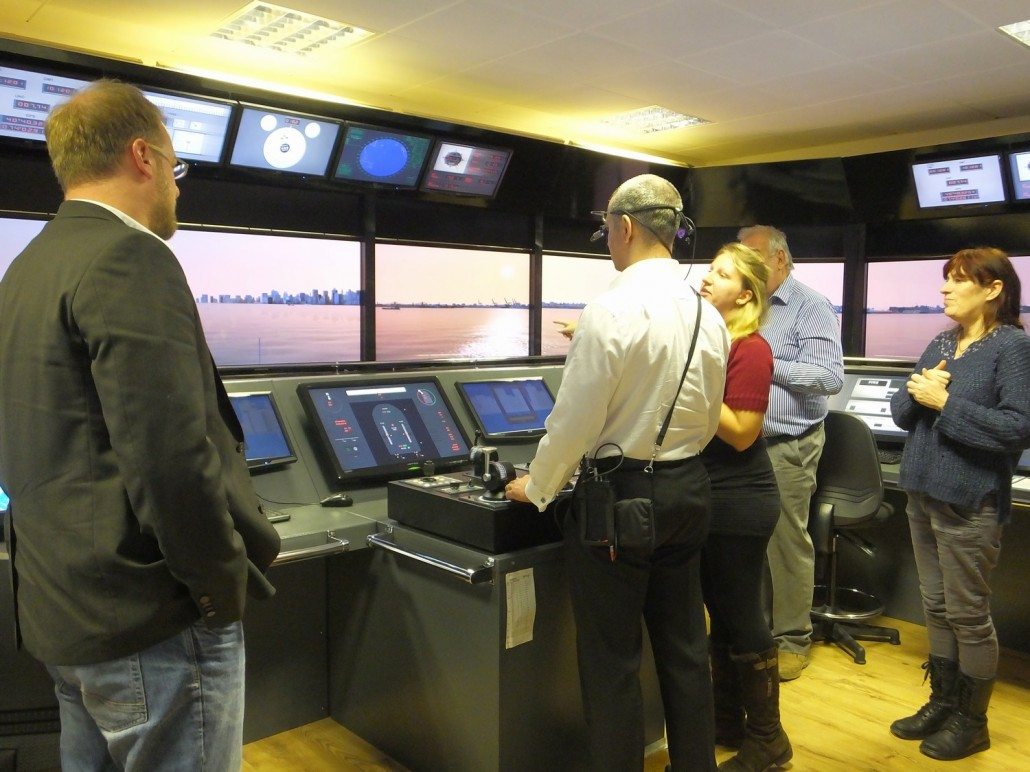
Image: Research carried out at the ECDIS Ltd training centre in co-operation with Bournemouth University
Admiral Nick Lambert a non executive director at ECDIS Ltd has been a keen participant in the documentation and development of training syllabi to suit the transition to digital native seafarers.
“Research through the eyes of current seafarers enables us to really understand their cognitive behaviour and as a result we can establish and provide the right training to really harness the potential of a bridge team.”
Recent reports and papers have indicated that in most cases, almost 96% of maritime accidents are due to the human error. The MAIB and other private investigative bodies are working together with companies and colleges to look into incidents, attempting to understand ways to eliminate or reduce the risk of these happening at sea.
Richard North, a well respected Marine Investigator from MADI (Marine Accident Digital Investigations Ltd) delivers the Investigation module of the new Bridge Team Managment course at ECDIS Ltd, he states:
“We are all aware the marine industry is a reactive one, to attempt to curb this philosophy we must understand what is currently failing the system. By engaging shipping companies and using this information we can help provide specific training material and be proactive in raising awareness through courses such as Bridge Team Management”
An example of this would be the recent addition of Voyage Data Recording modules as part of the BTM course. The evolution of adding new modules and elements to the traditional Bridge courses is what helps seafarers deal with their new concerns at sea.
In Conclusion
New ships, new ports, new skills, new Officers and a next generation of simulators are without doubt making bridge training courses more effective. Change isn’t coming; it’s already here but perhaps not spread as evenly throughout the world as we would hope.
A colleague of mine (Mark Broster) was recently presented a Fellowship with the Royal Institute of Navigation by HRH the Duke of Edinburgh for “In recognition of his significant and innovative contribution to the development of modern digital navigation and bridge team training in the global maritime industry”. His passion is ensuring that seafarers receive the best and most comprehensive training without cutting corners to save money or time. He is not alone in this quest, and there is significant work taking place all over the World to adapt to the needs of modern ships and seafarers. It would appear that there is light at the end of the tunnel.
If we do not all adapt we run the risk of being swept away with the digital tide. As we know, technology and tide waits for no one!

For further information:
Mike Backhouse
ECDIS Ltd
Ground Floor
Atlantic 3600 Building Parkway
Solent Business Park
Whiteley
Fareham
PO15 7AN
United Kingdom
Tel: +44 (0) 1489 559677
Email: [email protected]
Web: www.ecdis.org
NEWS: ECDIS Ltd Managing Director Mark Broster Awarded Fellowship by RiN
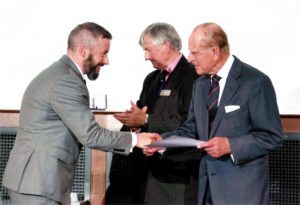
ECDIS Ltd Managing Director Mark Broster has been Awarded a Fellowship by RiN for ‘In recognition of his significant and innovative contribution to the development of modern digital navigation and bridge team training in the global maritime industry.’
The awards ceremony was held at the RiN (Royal Institute of Navigation) Annual Meeting on 19 July. The award was presented by HRH The Duke of Edinburgh in recognition of Mark’s significant contribution to digital navigation.
When asked about his achievement, Mark said:
“I am incredibly proud to have been presented with this award, sometimes it can feel as though all the hard work we have put in over the years is not being recognised within the industry, but this fellowship has clearly shown we are making a difference, and I am so appreciative to everyone at ECDIS Ltd for their tireless efforts, and to the RiN for this prestigious honour. However we still have a long way to go before the industry is up to date with modern navigation systems, and we have a lot of innovative and exciting projects in the pipeline.”
So watch this space!
Article
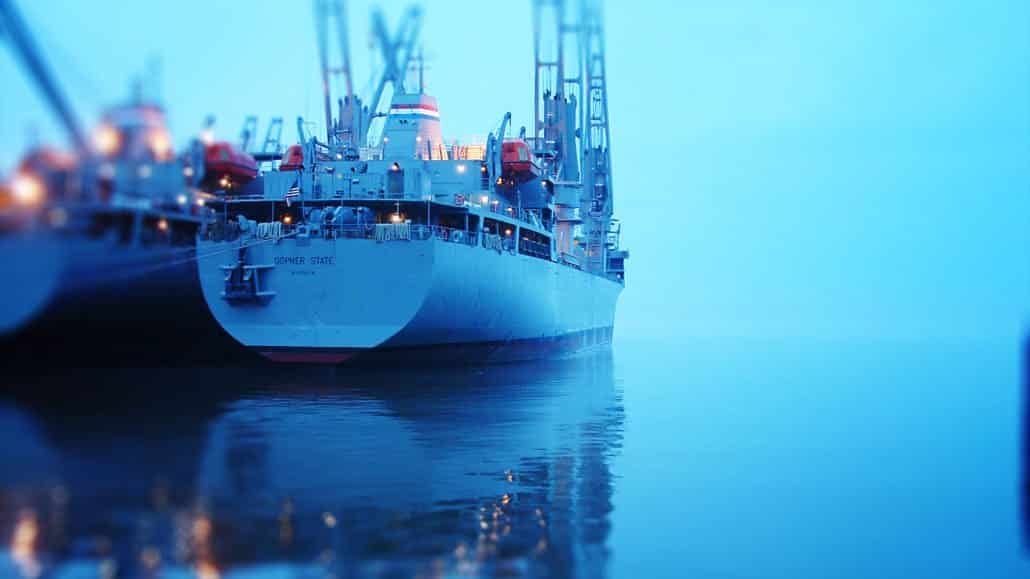
ECDIS ACAT (Annual Competency Assurance Training)
Inspectors get tough on ECDIS
The Inspectors training in ECDIS has without doubt increased safety at sea as it highlights that not all is well……regardless of certificates held!
Few are aware that the World is half way through an international project to train around 1000 Inspectors and PSC Officers in ECDIS. Without doubt, it has already dramatically increased the safety of navigation at sea by providing Inspecting Officers with all the relevant questions that need to be asked for all the 38 manufacturers, regardless of what certificates the Officers hold.
The feedback so far is proving that in some cases Officers cannot practically show inspectors the basic navigation and safety features designed to reduce the risk of groundings. The Inspector training that they are receiving has to be good for the industry, albeit not for some shipping companies that felt comfortable in the past of their Officers competencies, purely because they held ‘certificates’.
Indeed recently Captain Robert Pearcey, Marine Consultancy DP Annual Audits CMID, OVID Inspections Surveys & Accident Incident Investigation, shares one of his ECDIS audit inspections;
As an OVID and CMID inspector I can confirm that many operators can show no knowledge of basic safety features in ECDIS systems, or how to recover past data from ECDIS sometimes this is useful.
“I have also noted that ECDIS is not used on Jack up rigs under tow, expensive paper route charts are produced with people who have little knowledge of Marine matters, other than follow the tug. On one occasion when acting for BP as Marine observer I stopped a tug going into shallow water with undersell clearance of 1m. It would seem that ECDIS should be compulsory on tugs towing deep drafted MODUs and Barges.
The really concerning issue I found on a US operated rig a US office with a Belize Certificate , was issues a Marshall Island Certificate on producing a certificate in which there are no exams, people are finding ways round certification and this is concerning as Masters and Operators seem to be turning a blind eye. In this case the officer was navigating in the Malacca St. on a 6th generation drill ship, it was apparent he did not have much of a clue about ECDIS.
It is only a matter of time before we have a bad incident”.
One of the catalysts for the requirement for an Inspectors course in ECDIS was from a recommendation after the high profile MV OVIT grounding in the English Channel, where the investigation noted in Section 2.8.1 of the MAIB report:
Although the SIRE inspection occurred only 10 days before the grounding, the two navigation-related observations reported indicate that the inspection went into some detail. Nevertheless, the inspection did not identify the crew’s lack of competence in using ECDIS, or the significant defect with its audible alarm. It is recognised that audits and inspections are a sampling process; it would be impossible to check every facet of a ship’s navigation within a reasonable timescale. However, as ECDIS is replacing paper charts as the primary means of navigation on many vessels, it is imperative that auditors and inspectors are able to identify problems in the way ECDIS are managed, maintained and used. The degree of understanding required of an auditor to check that ENC data in an ECDIS is up to date is clearly more complex than that required to check a written passage plan, and the correction status of paper charts and nautical publications. 48 Many auditors and inspectors do not have a background in navigation, and those that do might not have been trained in ECDIS. Consequently, few will have even a basic understanding of the system, leaving them ill-equipped to assess a core safety-critical function, that of safe navigation. Therefore, there is a strong case for the development and provision of tools that will enable auditors and inspectors to properly check the use and performance of this equipment
The following was part of the recommendations in the document after the MAIB investigation:
SECTION 5 – Recommendation
The International Chamber of Shipping (ICS) and the Oil Companies International Marine Forum (OCIMF) are recommended to:
142/2014 In conjunction with ECDIS experts develop and promulgate a set of focused questions for use by surveyors and auditors when conducting audits and inspections on ECDIS fitted ships.
(Above MAIB material provided from Report NO 24/2014 MAIB. Crown Copyright)
I was pleased to be part of the team engaged as the ECDIS experts to write and deliver courses all over the World over the last few years, and write the top 20 Navigation and Safety questions, used globally and now 50 reasonable ECDIS questions that all Officers should be expected to answer.
Over the years my colleagues and I have only trained several thousand seafarers in the 8 hour Type Specific (TS) courses, which is a fraction of a percent of the Global Seafarers currently conducting TS training. The recent White Paper on ECDIS TS (available for download on the eMG Hub app on Android or Apple), highlights the international confusion in both requirements and standards. What is also becoming clear, is regardless of how well trained you are, we are all subject to skill fade if not using the equipment for some time, and, the 38 manufacturers are always (quite rightly) updating their software to the changing performance standards.
Paul Hebden Master Mariner,
“My main reasons for retiring, was the enforced implementation of ECDIS on our ships as our Primary Means of Navigation (PMN), with minimal paper charts as back up….. It’s not a case of IF we will have a serious navigational incident, but WHEN…… and after 25 incident free years as Master….. It was time to go”.
There are many recent initiatives to try and bridge this gap, but a brand new service which is gripping interest in the Maritime Industry is ECDIS ACAT www.eMaritimeTraining.com which currently charges £200 per year, per hull, regardless of Officer numbers or changes, to keep all crew up-to-date on the top navigation elements of the 38 ECDIS manufacturers.”
Matt Riley, Compliance Officer, CSO and DPA,
“I can attest from my own experience of both working at sea and completing ECDIS training that services and products, such as this new service (ECDIS ACAT) are indeed in demand!”
George Ward, Project Support for ECDIS ACAT, states that:
“ECDIS ACAT is an effective assurance method of assisting the Maritime Industry as a whole to increase their underpinning knowledge in the Make and Model of their ECDIS fitted onboard and to keep up-to-date with the constantly evolving software from all the manufacturers worldwide. This product also allows the Ship Manager or Operator to have positive control over their Officers Annual Competency Assurance with regards to ECDIS, which in turn would reduce their training safety matrix for navigating with ECDIS.”
The feedback I have received is that there are thousands of seafarers with all of the required certificates, however disappointingly many have not been able to answer the basic navigation and safety questions now asked by Inspectors World-Wide. I must clarify at this point, these are basic navigation questions that Officers would have been able to answer on paper charts, such as “Show me on the chart the relevant chart notes, What is the reliability of the chart? How do you show Safe/Unsafe Water? and Can you show me how you can put a Manual Correction on the chart?”. None of the questions or recent observations raised by inspectors has been based on how to calculate a Horizontal sextant angle on the ECDIS!
Two years in and the feedback from he industry shows that prior to training, some inspectors found it very difficult to ensure the Bridge team actually understood the practical use of their ECDIS. After training, inspectors are generating multiple observations where ships Officers don’t understand the fundamental principles to keep their ship safe when using ECDIS.
The aim of training Inspectors in ECDIS around the world was to increase standards and reduce the risk of groundings. It is not to give to give Officers at sea a `hard time`, I know from experience the challenges of being an Officer at sea are hard enough without additional pressures. In summary, as an industry, all is not well, however all is not lost.

For further information:
Mike Backhouse
ECDIS Ltd
Ground Floor
Atlantic 3600 Building Parkway
Solent Business Park
Whiteley
Fareham
PO15 7AN
United Kingdom
Tel: +44 (0) 1489 559677
Email: [email protected]
Web: www.ecdis.org
The post ARTICLE: ECDIS ACAT (Annual Competency Assurance Training) – Inspectors get tough on ECDIS appeared first on ECDIS Training Courses and Advice.
Press Release
August 2016
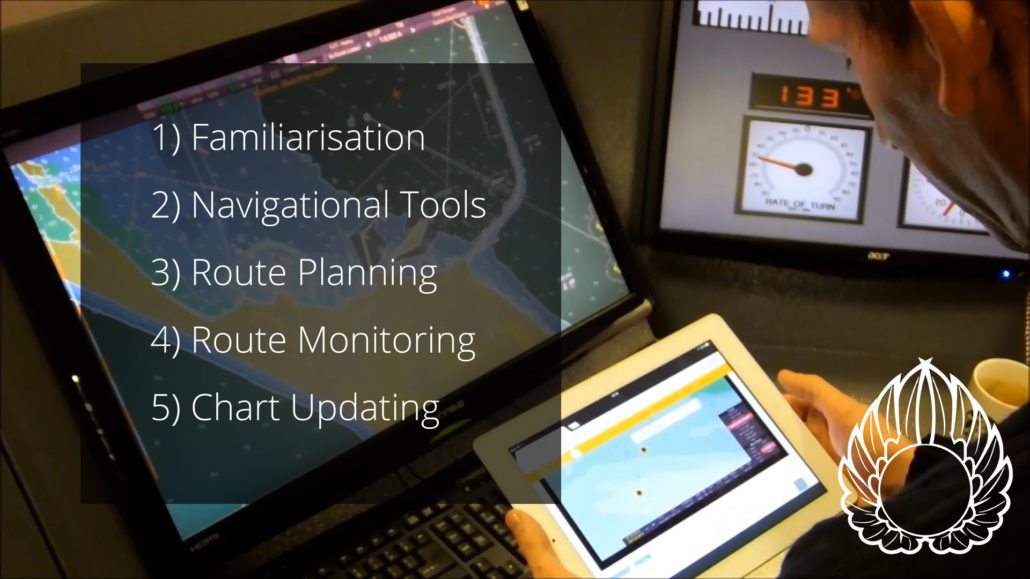
New ECDIS Annual Competency Assurance Training (ACATS) Service
This new annual service was produced in conjunction with the top 20 questions used for ECDIS Audit Inspections and the Inspectors ECDIS Course, both designed by ECDIS Ltd.
[Whiteley, Hampshire August 2016] For £200 per Hull, per year, regardless of the number of Officers or annual turnover of crew, it is now possible to keep the entire Bridge Team up-to-date regardless of which of the varying 38 manufacturers of ECDIS currently circulating the industry.
ECDIS ACATS ensures that the Officers are: 1) Up to date every year with any changes to the make and model of the ECDIS onboard, 2) Understand the key functions for safe navigation, 3) Prepared for PSC or an independent audit or inspection, 4) Refreshed annually in their knowledge of key menus and operational capability of the ECDIS, and 5) Company compliant in ECDIS through annual assessments.
George Ward, Project Support for ECDIS ACATS, which is based in ECDIS Ltd, Hampshire, states that “ECDIS ACATS is an effective assurance method of assisting the Maritime Industry as a whole to increase their underpinning knowledge in the Make and Model of their ECDIS fitted onboard and to keep up-to-date with the constantly evolving software from all the manufacturers worldwide. This product also allows the Ship Manager or Operator to have positive control over their Officers Annual Competency Assurance with regards to ECDIS, which in turn would reduce their training safety matrix for navigating with ECDIS.”
To view the video clip explaining more visit: http://www.emaritimetraining.com
For further information:
Mike Backhouse
ECDIS Ltd
Ground Floor
Atlantic 3600 Building Parkway
Solent Business Park
Whiteley
Fareham
PO15 7AN
United Kingdom
Tel: +44 (0) 1489 559677
Email: [email protected]
Web: www.ecdis.org
Press Release
August 2016

New ECDIS Annual Competency Assurance Training (ACATS) Service
This new annual service was produced in conjunction with the top 20 questions used for ECDIS Audit Inspections and the Inspectors ECDIS Course, both designed by ECDIS Ltd.
[Whiteley, Hampshire August 2016] For £200 per Hull, per year, regardless of the number of Officers or annual turnover of crew, it is now possible to keep the entire Bridge Team up-to-date regardless of which of the varying 38 manufacturers of ECDIS currently circulating the industry.
ECDIS ACATS ensures that the Officers are: 1) Up to date every year with any changes to the make and model of the ECDIS onboard, 2) Understand the key functions for safe navigation, 3) Prepared for PSC or an independent audit or inspection, 4) Refreshed annually in their knowledge of key menus and operational capability of the ECDIS, and 5) Company compliant in ECDIS through annual assessments.
George Ward, Project Support for ECDIS ACATS, which is based in ECDIS Ltd, Hampshire, states that “ECDIS ACATS is an effective assurance method of assisting the Maritime Industry as a whole to increase their underpinning knowledge in the Make and Model of their ECDIS fitted onboard and to keep up-to-date with the constantly evolving software from all the manufacturers worldwide. This product also allows the Ship Manager or Operator to have positive control over their Officers Annual Competency Assurance with regards to ECDIS, which in turn would reduce their training safety matrix for navigating with ECDIS.”
To view the video clip explaining more visit: http://www.emaritimetraining.com
For further information:
Mike Backhouse
ECDIS Ltd
Ground Floor
Atlantic 3600 Building Parkway
Solent Business Park
Whiteley
Fareham
PO15 7AN
United Kingdom
Tel: +44 (0) 1489 559677
Email: [email protected]
Web: www.ecdis.org
The post PRESS RELEASE: New ECDIS Annual Competency Assurance Training (ACATS) Service appeared first on ECDIS Training Courses and Advice.
Article

Effective Maritime Instructors – What are they?
By Mr R.A.J Sloly (26 years of Experience as an Instructor and Seafarer)
Poor training can lead to catastrophic accidents both financially and with loss of life, this is an unavoidable fact. The maritime industry is sadly far behind its counterparts in the aviation industry with regards to the importance placed on good quality, practical, effective training and this urgently needs to be addressed. But where does this importance start? Is it with the crew? The ships? The companies? I believe it begins with the trainers; Good quality training must come from passionate, dedicated instructors who understand their responsibly to the maritime community.
Food for thought: “Is a good maritime instructor someone with good maritime experience or someone with good instruction techniques that can pass on information effectively? Naturally the answer should be both, but from your experience of training schools, how many instructors exist with both attributes?”
Effective training delivery has always been and will always be a deep rooted passion of a good maritime instructor, and one that I certainly refuse to water down under increasing pressure from an industry that often looks to reduce training requirements. Having looked extensively into Cognitive Behavioural Therapy (CBT) as well as Neuro-linguistic Programming (NLP), as an industry we don’t need to go anywhere near as far as this to achieve effective training as we strive to deliver motivated crews to vessels. As an instructor for over 50 HELM courses (at both Management and Operational levels) as well as a number of IMO 6.09 “Training Course for Instructors” and IMO 6.10 “Train The Simulator Instructor and Assessor” courses over the last few years, this has thrown up many questions, but one central/pivotal question continually rears its head.
Question. As an industry are we simply looking for a financial return from sending crew members on training courses as they supposedly reduce marine risk, or, are we actually looking for a tangible improvement in the quality of the seafarer and the industry as a whole?
I would argue that it cannot be our motivation as lecturers to just read out facts and figures in a hap hazard fashion, such as the `tick box` courses of the past. We must inject all our efforts and approach training delivery in a dynamic fashion in order that we expose – as much as humanly possible – students to a concrete learning experience that not only passes skills designed to reduce marine risk, but also make the individual a better seafarer and improves the industry long term as a whole. This approach is summarised by David Kolbs, an Education Theorist.

Above Image: Kolbs four stage learning cycle.
This is so they will know When, How and Why to apply the principles of their new found skill in a measured – autonomous fashion as opposed to a petulant “That’s what the instructor told me to do” mindset. After all we must never forget we are `The Guardians of the Standards` for delivery of training packages in the 21st Century.
Some of the qualities I believe we must develop and nurture as we become instructors.
There is one very important aid that we put in front of all students which can have more impact and influence on the effectiveness of training than any other media……YOU. We can all recognise what we consider to be a good instructor and that one instructor is very different from another.
Qualities an instructor should possess:
- Confidence. You need to have confidence to be fully effective; firstly confidence with the material that you are instructing and secondly confidence in your abilities to deliver that material.
- Bearing. How do you appear to the class? Be aware of your image in front of the class and ensure that that image is not in itself a distraction.
- Avoid anything that could be a distraction to the students. This may be something repeatedly said such as “ok” or “right” or constantly jangling keys or coins in your pocket or pacing up and down over the same area.
- Voice. Modulate the voice and use pauses for effect and emphasis. Varying the rhythm, speed, volume and pitch of your voice will help to keep the attention of the class.
- Eye Contact. Eye contact is one of the most important aspects of Body Language. Making eye contact with your students will help you to gauge whether your message is being truly received and understood.
- Conduct/Behaviour. Your attitude is important as this ultimately will influence the rapport you have with your students.
- Enthusiasm. An enthusiastic manner adopted by the instructor can have a greater effect on the learning process than any other quality. It has the ability to make a mediocre lesson into a good one and conversely, lack of enthusiasm can turn a good lesson into a poor one.
In conclusion, below is an extract from an interview with a newly qualified assistant Marine Instructor, who has never been to sea or instructed in a professional environment before.
“When I joined the training centre I was originally employed to manage and facilitate IT equipment, from basic desktop computers to advanced electronic programmes. Based on my computing knowledge I soon found myself assisting the established Maritime Instructors with chart uploads and VRD playback. I was under the impression as I watched other instructors that lecturing was just the process for throwing a load of facts at a student, they learnt it, we test their ability to learn it and then they go back to sea. When I was approached and asked if I felt comfortable delivering part of a lesson (the technical side of the course) I jumped at the chance as I thought that that was all I had to do…. I was wrong! Previous to this I had only delivered training on a voluntary basis within my passion for technology. As a standard course of action, the company encouraged and guided me as I underwent the full remit of train the trainer courses available. I was naturally apprehensive but gained so much understanding of the industry and how it, and more to the point I, can make mistakes as a result of simple complacency. The lessons I have learnt stayed with me and I draw on those skills on a daily basis.
As a result I moved over and started to support the bridge course as the exercise controller and swiftly found myself becoming a Co-Teacher. Having now completing the IMO 6.09 “Train the Trainer” Course, this for me has paid dividends as it pulled all my skills together and assembled them in a more structured form as opposed to a hap hazard order. This in turn allowed me to understand how proper measured training packages are formulated and that instruction is not just a matter of regurgitating chunks of information; there is a whole thought process that goes into it which I was unaware of. The approach to teaching crew members (Adults – Andragogy) is very different to teaching children (Pedagogy). Having studied the differences extensively, I think that this (Pedagogy) is how many training packages have, or are, being delivered in some elements of our industry from my observations.
Looking back at the 6 week training/education package that I received in Whiteley, Southampton, using the process of Andragogy, develop my understanding, skills and the knowledge to become an effective instructor, I am fully aware that my current skill set needs to be nurtured as I move forward as an instructor in our industry, a challenge and prospect that I am looking forward to. I am a non-mariner, and non-conventionally trained instructor, however, in the role of teaching support I can clearly see that the ability to effectively pass information is just as important as the lead instructors maritime background and teaching qualifications.”

For further information:
Mike Backhouse
ECDIS Ltd
Ground Floor
Atlantic 3600 Building Parkway
Solent Business Park
Whiteley
Fareham
PO15 7AN
United Kingdom
Tel: +44 (0) 1489 559677
Email: [email protected]
Web: www.ecdis.org
Article

Effective Maritime Instructors – What are they?
By Mr R.A.J Sloly (26 years of Experience as an Instructor and Seafarer)
Poor training can lead to catastrophic accidents both financially and with loss of life, this is an unavoidable fact. The maritime industry is sadly far behind its counterparts in the aviation industry with regards to the importance placed on good quality, practical, effective training and this urgently needs to be addressed. But where does this importance start? Is it with the crew? The ships? The companies? I believe it begins with the trainers; Good quality training must come from passionate, dedicated instructors who understand their responsibly to the maritime community.
Food for thought: “Is a good maritime instructor someone with good maritime experience or someone with good instruction techniques that can pass on information effectively? Naturally the answer should be both, but from your experience of training schools, how many instructors exist with both attributes?”
Effective training delivery has always been and will always be a deep rooted passion of a good maritime instructor, and one that I certainly refuse to water down under increasing pressure from an industry that often looks to reduce training requirements. Having looked extensively into Cognitive Behavioural Therapy (CBT) as well as Neuro-linguistic Programming (NLP), as an industry we don’t need to go anywhere near as far as this to achieve effective training as we strive to deliver motivated crews to vessels. As an instructor for over 50 HELM courses (at both Management and Operational levels) as well as a number of IMO 6.09 “Training Course for Instructors” and IMO 6.10 “Train The Simulator Instructor and Assessor” courses over the last few years, this has thrown up many questions, but one central/pivotal question continually rears its head.
Question. As an industry are we simply looking for a financial return from sending crew members on training courses as they supposedly reduce marine risk, or, are we actually looking for a tangible improvement in the quality of the seafarer and the industry as a whole?
I would argue that it cannot be our motivation as lecturers to just read out facts and figures in a hap hazard fashion, such as the `tick box` courses of the past. We must inject all our efforts and approach training delivery in a dynamic fashion in order that we expose – as much as humanly possible – students to a concrete learning experience that not only passes skills designed to reduce marine risk, but also make the individual a better seafarer and improves the industry long term as a whole. This approach is summarised by David Kolbs, an Education Theorist.
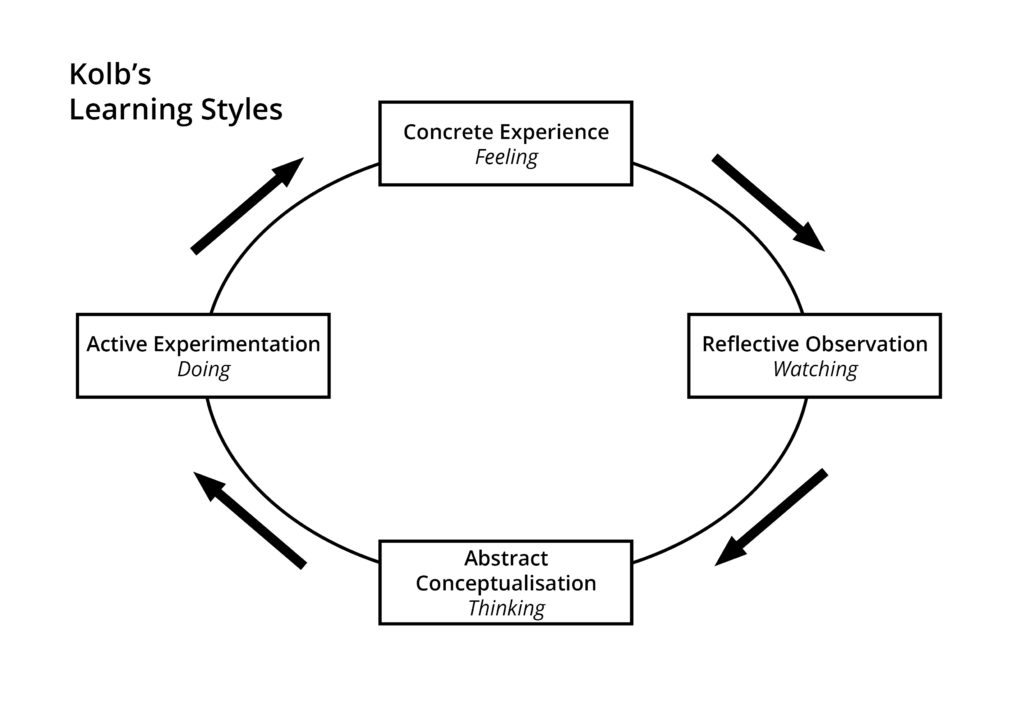
Above Image: Kolbs four stage learning cycle.
This is so they will know When, How and Why to apply the principles of their new found skill in a measured – autonomous fashion as opposed to a petulant “That’s what the instructor told me to do” mindset. After all we must never forget we are `The Guardians of the Standards` for delivery of training packages in the 21st Century.
Some of the qualities I believe we must develop and nurture as we become instructors.
There is one very important aid that we put in front of all students which can have more impact and influence on the effectiveness of training than any other media……YOU. We can all recognise what we consider to be a good instructor and that one instructor is very different from another.
Qualities an instructor should possess:
- Confidence. You need to have confidence to be fully effective; firstly confidence with the material that you are instructing and secondly confidence in your abilities to deliver that material.
- Bearing. How do you appear to the class? Be aware of your image in front of the class and ensure that that image is not in itself a distraction.
- Avoid anything that could be a distraction to the students. This may be something repeatedly said such as “ok” or “right” or constantly jangling keys or coins in your pocket or pacing up and down over the same area.
- Voice. Modulate the voice and use pauses for effect and emphasis. Varying the rhythm, speed, volume and pitch of your voice will help to keep the attention of the class.
- Eye Contact. Eye contact is one of the most important aspects of Body Language. Making eye contact with your students will help you to gauge whether your message is being truly received and understood.
- Conduct/Behaviour. Your attitude is important as this ultimately will influence the rapport you have with your students.
- Enthusiasm. An enthusiastic manner adopted by the instructor can have a greater effect on the learning process than any other quality. It has the ability to make a mediocre lesson into a good one and conversely, lack of enthusiasm can turn a good lesson into a poor one.
In conclusion, below is an extract from an interview with a newly qualified assistant Marine Instructor, who has never been to sea or instructed in a professional environment before.
“When I joined the training centre I was originally employed to manage and facilitate IT equipment, from basic desktop computers to advanced electronic programmes. Based on my computing knowledge I soon found myself assisting the established Maritime Instructors with chart uploads and VRD playback. I was under the impression as I watched other instructors that lecturing was just the process for throwing a load of facts at a student, they learnt it, we test their ability to learn it and then they go back to sea. When I was approached and asked if I felt comfortable delivering part of a lesson (the technical side of the course) I jumped at the chance as I thought that that was all I had to do…. I was wrong! Previous to this I had only delivered training on a voluntary basis within my passion for technology. As a standard course of action, the company encouraged and guided me as I underwent the full remit of train the trainer courses available. I was naturally apprehensive but gained so much understanding of the industry and how it, and more to the point I, can make mistakes as a result of simple complacency. The lessons I have learnt stayed with me and I draw on those skills on a daily basis.
As a result I moved over and started to support the bridge course as the exercise controller and swiftly found myself becoming a Co-Teacher. Having now completing the IMO 6.09 “Train the Trainer” Course, this for me has paid dividends as it pulled all my skills together and assembled them in a more structured form as opposed to a hap hazard order. This in turn allowed me to understand how proper measured training packages are formulated and that instruction is not just a matter of regurgitating chunks of information; there is a whole thought process that goes into it which I was unaware of. The approach to teaching crew members (Adults – Andragogy) is very different to teaching children (Pedagogy). Having studied the differences extensively, I think that this (Pedagogy) is how many training packages have, or are, being delivered in some elements of our industry from my observations.
Looking back at the 6 week training/education package that I received in Whiteley, Southampton, using the process of Andragogy, develop my understanding, skills and the knowledge to become an effective instructor, I am fully aware that my current skill set needs to be nurtured as I move forward as an instructor in our industry, a challenge and prospect that I am looking forward to. I am a non-mariner, and non-conventionally trained instructor, however, in the role of teaching support I can clearly see that the ability to effectively pass information is just as important as the lead instructors maritime background and teaching qualifications.”

For further information:
Mike Backhouse
ECDIS Ltd
Ground Floor
Atlantic 3600 Building Parkway
Solent Business Park
Whiteley
Fareham
PO15 7AN
United Kingdom
Tel: +44 (0) 1489 559677
Email: [email protected]
Web: www.ecdis.org
The post ARTICLE: Effective Maritime Instructors – What are they? appeared first on ECDIS Training Courses and Advice.
Press Release
May 2016
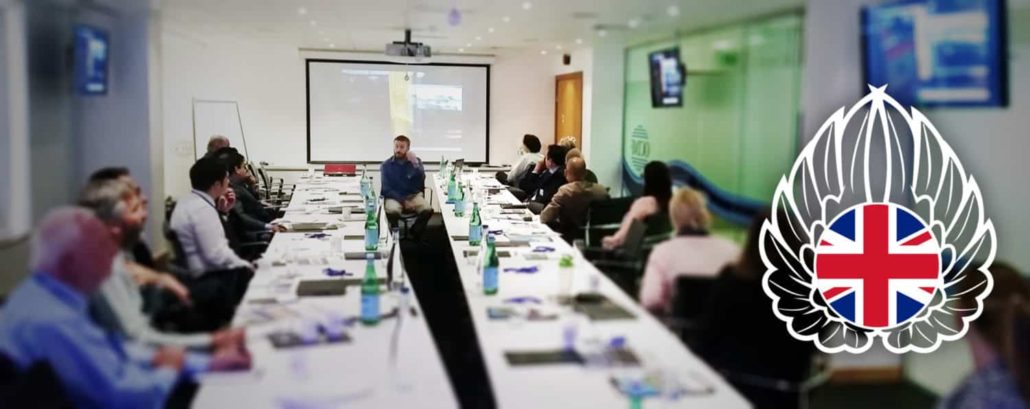
ECDIS Ltd London Seminar Great Success
ECDIS Ltd has been touring the world with a series of seminars titled “ECDIS Inspections: Marine Risk Reduction, Detentions & Best Practice”. The latest, held at the London OCIMF headquarters, was well received with high praise from all attendees.
[Whiteley, Hampshire May 2016] The seminar was the biggest to date with representatives from some of the world’s top shipping companies and covered by the global press with readership well in excess of 150,000.
Numerous shipping companies attending including: BP Shipping, MOL Tankers Management, Columbia Shipmanagement, Cosco Maritime, Euroship Services, Global Marine Systems, Graig Ship Management, IHS Maritime and Trade, James Fisher Shipping Services, K Line LNG Shipping, NYK LNG Shipmanagement, PACC Ship, Pritchard-Gordon Tankers, Tanker Operator and Willhelmsen Lines Car Carriers.
The seminar titled “ECDIS Inspections: Marine Risk Reduction, Detentions & Best Practice” provides the delegates with practical, insightful knowledge of the best ways to prevent lengthy, costly port detentions; something which all global shipping companies want to avoid.
Feedback from the seminar has been exemplary:
“Informative, engaging and wonderful.” – NYK LNG Shipmanagement (UK) Ltd.
“Very well presented, highlighting the challenges that are still to be addressed with this system and by the people that actually use it.” – Cosco Maritime
“ Mark and Robyn’s relaxed approach fostered intelligent debating of the issues but they clearly knew the subject inside out… I did find the case studies (accidents, detentions) particularly interesting and came away with the impression that’s their still a great deal to be done to maximise the effectiveness of ECDIS as a navigation tool” . – IHS Maritime
“ I found the seminar of great benefit, both Mark Broster and Robyn Harrigan’s presentations and knowledge were excellent.” – Pritchard-Gordon Tankers Ltd
When asked, all attendees would highly recommend future seminars to friends or colleagues, and on the day of the seminar many people expressed great interest in attending a seminar with us again next year. Watch this space!
Download PDF
For further information:
Mike Backhouse
ECDIS Ltd
Ground Floor
Atlantic 3600 Building Parkway
Solent Business Park
Whiteley
Fareham
PO15 7AN
United Kingdom
Tel: +44 (0) 1489 559677
Email: [email protected]
Web: www.ecdis.org
Press Release
May 2016

ECDIS Ltd London Seminar Great Success
ECDIS Ltd has been touring the world with a series of seminars titled “ECDIS Inspections: Marine Risk Reduction, Detentions & Best Practice”. The latest, held at the London OCIMF headquarters, was well received with high praise from all attendees.
[Whiteley, Hampshire May 2016] The seminar was the biggest to date with representatives from some of the world’s top shipping companies and covered by the global press with readership well in excess of 150,000.
Numerous shipping companies attending including: BP Shipping, MOL Tankers Management, Columbia Shipmanagement, Cosco Maritime, Euroship Services, Global Marine Systems, Graig Ship Management, IHS Maritime and Trade, James Fisher Shipping Services, K Line LNG Shipping, NYK LNG Shipmanagement, PACC Ship, Pritchard-Gordon Tankers, Tanker Operator and Willhelmsen Lines Car Carriers.
The seminar titled “ECDIS Inspections: Marine Risk Reduction, Detentions & Best Practice” provides the delegates with practical, insightful knowledge of the best ways to prevent lengthy, costly port detentions; something which all global shipping companies want to avoid.
Feedback from the seminar has been exemplary:
“Informative, engaging and wonderful.” – NYK LNG Shipmanagement (UK) Ltd.
“Very well presented, highlighting the challenges that are still to be addressed with this system and by the people that actually use it.” – Cosco Maritime
“ Mark and Robyn’s relaxed approach fostered intelligent debating of the issues but they clearly knew the subject inside out… I did find the case studies (accidents, detentions) particularly interesting and came away with the impression that’s their still a great deal to be done to maximise the effectiveness of ECDIS as a navigation tool” . – IHS Maritime
“ I found the seminar of great benefit, both Mark Broster and Robyn Harrigan’s presentations and knowledge were excellent.” – Pritchard-Gordon Tankers Ltd
When asked, all attendees would highly recommend future seminars to friends or colleagues, and on the day of the seminar many people expressed great interest in attending a seminar with us again next year. Watch this space!
Download PDF
For further information:
Mike Backhouse
ECDIS Ltd
Ground Floor
Atlantic 3600 Building Parkway
Solent Business Park
Whiteley
Fareham
PO15 7AN
United Kingdom
Tel: +44 (0) 1489 559677
Email: [email protected]
Web: www.ecdis.org
The post PRESS RELEASE: ECDIS Ltd London Seminar Great Success appeared first on ECDIS Training Courses and Advice.
Press Release
April 2016
ECDIS Inspectors Course Milestone Reached
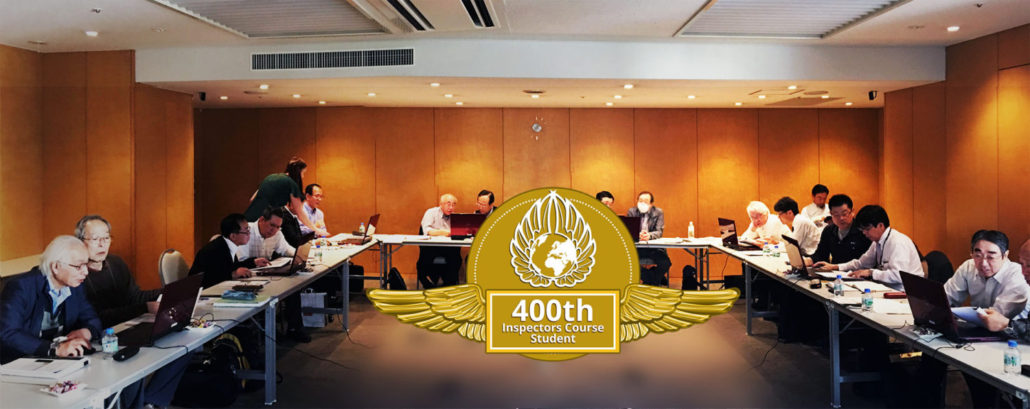
ECDIS Ltd is proudly celebrating the 400th student attending their Inspectors Course.
[Whiteley, Hampshire April 2016] Now training on all contents from New Orleans to Tokyo, the ECDIS Ltd Inspectors Course is internationally renowned and fast becoming one of their most popular maritime courses. The course has evolved over the last 5 years to be exactly what the inspector needs, namely relevant questions to ask, and reasonable expectations from the bridge teams on the practical understanding of their navigation system.
The course leaves the inspector armed with the right level of understanding of the minimum standard expected over all 38 manufacturers of ECDIS, and practical questions to ask the team ensuring the ship can safely use their ECDIS, regardless of what certificates they may hold. The full breakdown of the course is available at the below link and was recently summarised by Harry Williams, an inspector during an OCIMF course, as “The best practical training course relating to the job I have ever attended”.
Managing Director Mark Broster commented “Our key focus on the Inspectors course was to proactively help the industry learn what specifics to look for when dealing with observations, detentions and recent grounding that could have been avoided. We have seen considerable take-up from all sectors of the industry as they have seen the true potential in this course as a means of helping mitigate risk”
For further details of the ECDIS Ltd Inspectors Course please visit: https://www.ecdis.org/inspectors
Download PDF
For further information:
Mike Backhouse
ECDIS Ltd
Ground Floor
Atlantic 3600 Building Parkway
Solent Business Park
Whiteley
Fareham
PO15 7AN
United Kingdom
Tel: +44 (0) 1489 559677
Email: [email protected]
Web: www.ecdis.org

